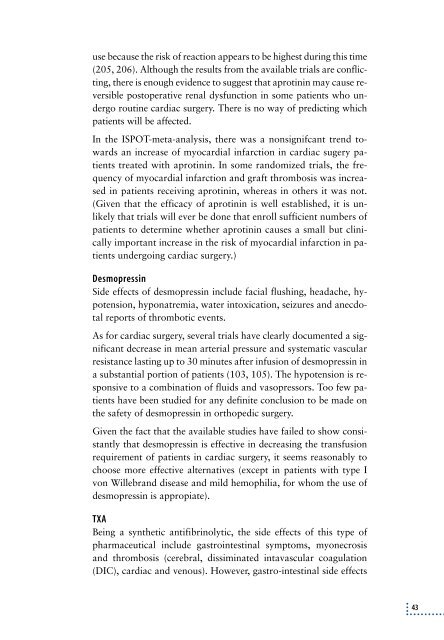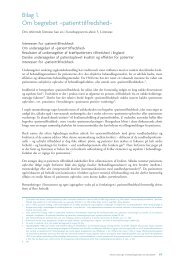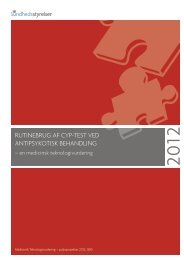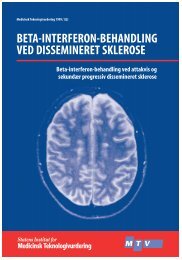Elektronisk udgave - Sundhedsstyrelsen
Elektronisk udgave - Sundhedsstyrelsen
Elektronisk udgave - Sundhedsstyrelsen
You also want an ePaper? Increase the reach of your titles
YUMPU automatically turns print PDFs into web optimized ePapers that Google loves.
use because the risk of reaction appears to be highest during this time<br />
(205, 206). Although the results from the available trials are conflicting,<br />
there is enough evidence to suggest that aprotinin may cause reversible<br />
postoperative renal dysfunction in some patients who undergo<br />
routine cardiac surgery. There is no way of predicting which<br />
patients will be affected.<br />
In the ISPOT-meta-analysis, there was a nonsignifcant trend towards<br />
an increase of myocardial infarction in cardiac sugery patients<br />
treated with aprotinin. In some randomized trials, the frequency<br />
of myocardial infarction and graft thrombosis was increased<br />
in patients receiving aprotinin, whereas in others it was not.<br />
(Given that the efficacy of aprotinin is well established, it is unlikely<br />
that trials will ever be done that enroll sufficient numbers of<br />
patients to determine whether aprotinin causes a small but clinically<br />
important increase in the risk of myocardial infarction in patients<br />
undergoing cardiac surgery.)<br />
Desmopressin<br />
Side effects of desmopressin include facial flushing, headache, hypotension,<br />
hyponatremia, water intoxication, seizures and anecdotal<br />
reports of thrombotic events.<br />
As for cardiac surgery, several trials have clearly documented a significant<br />
decrease in mean arterial pressure and systematic vascular<br />
resistance lasting up to 30 minutes after infusion of desmopressin in<br />
a substantial portion of patients (103, 105). The hypotension is responsive<br />
to a combination of fluids and vasopressors. Too few patients<br />
have been studied for any definite conclusion to be made on<br />
the safety of desmopressin in orthopedic surgery.<br />
Given the fact that the available studies have failed to show consistantly<br />
that desmopressin is effective in decreasing the transfusion<br />
requirement of patients in cardiac surgery, it seems reasonably to<br />
choose more effective alternatives (except in patients with type I<br />
von Willebrand disease and mild hemophilia, for whom the use of<br />
desmopressin is appropiate).<br />
TXA<br />
Being a synthetic antifibrinolytic, the side effects of this type of<br />
pharmaceutical include gastrointestinal symptoms, myonecrosis<br />
and thrombosis (cerebral, dissiminated intavascular coagulation<br />
(DIC), cardiac and venous). However, gastro-intestinal side effects<br />
43

















